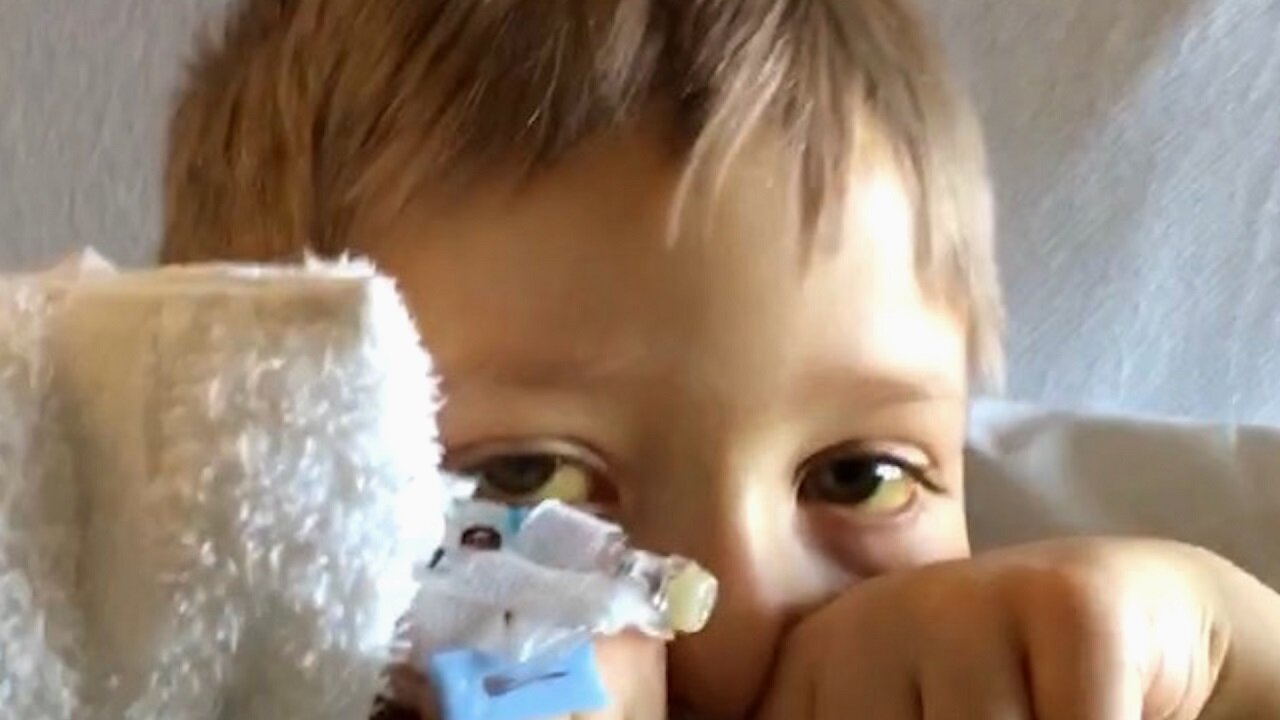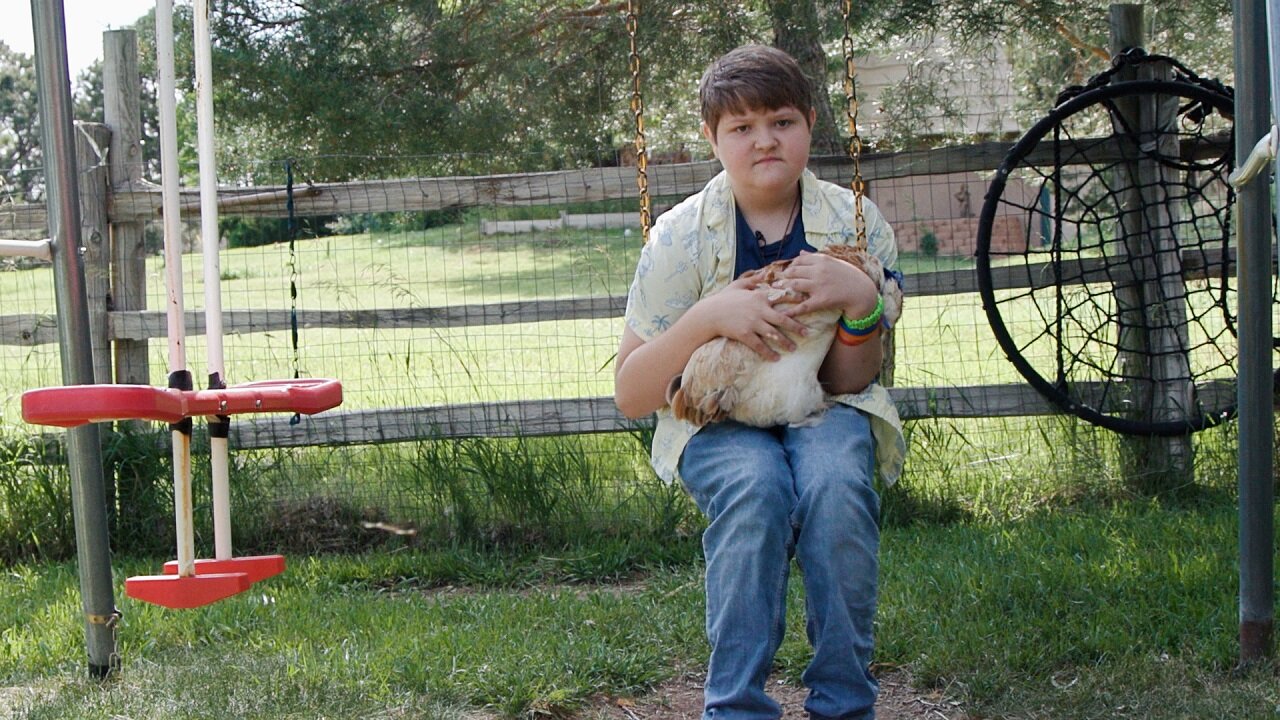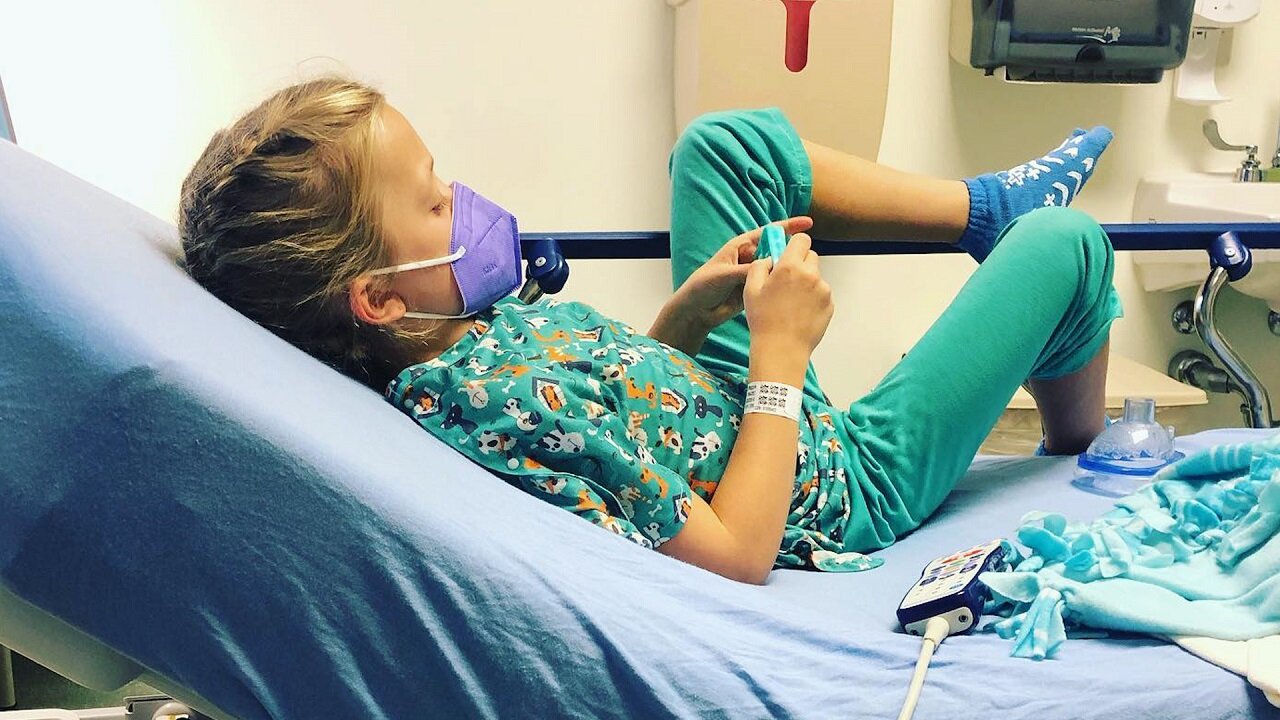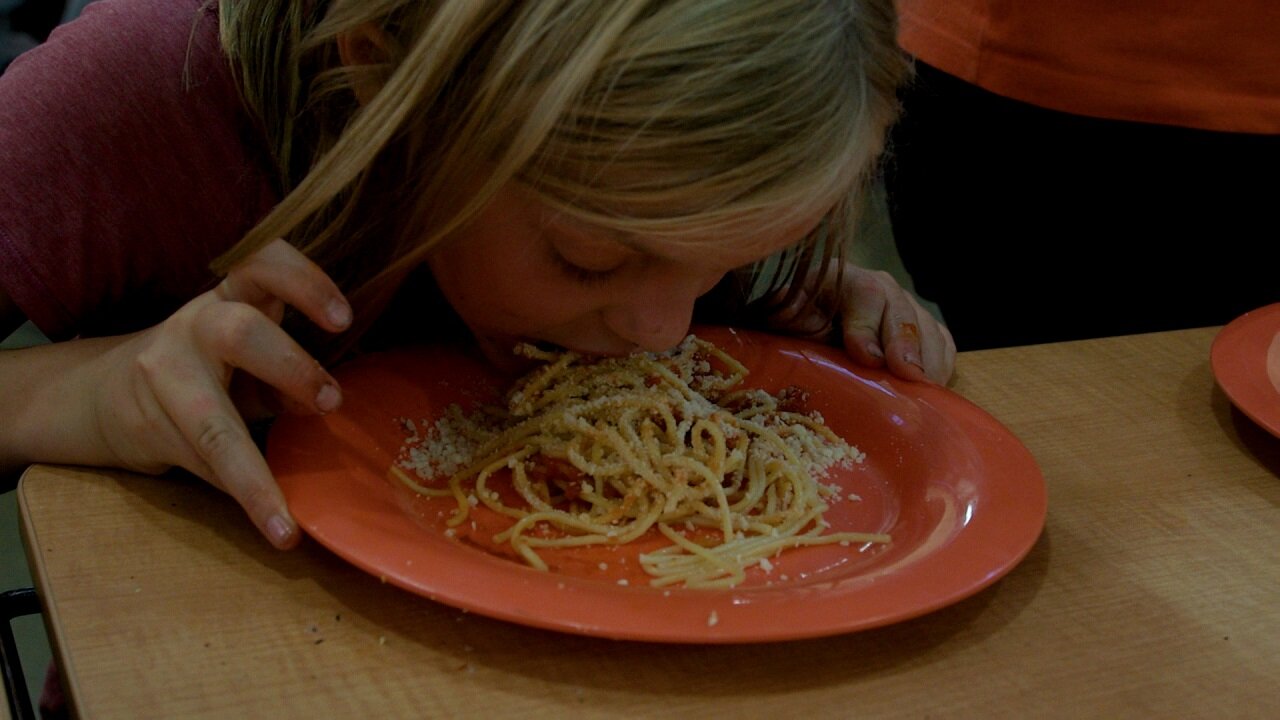The joys of being a kid

This article is part of an upcoming episode of Colorado Experience, you can learn more here.
GYPSUM, Colo. — In any other cafeteria full of kids and noise, Maggie Bamesberger and Greyson Saunders might feel like no one understands them. This one is different.
Maggie, 9, and Greyson, 13, both live with medical conditions that make life challenging — and sometimes isolating. They’re two of the dozens of kids in the Roundup River Ranch Camp cafeteria with similar diagnoses.
“Here's a kid who didn't get to have a normal life. He didn't get to go to school. He didn't get to ride a bike,” said John Saunders, Greyson’s father. "We know that … But he gets to go do this and … that's the fun, that's the good stuff.”
Roundup River Ranch Camp, located near Gypsum, is a free camp for kids living with serious medical conditions. During the summer, the camp hosts six week-long sessions for children from across the country. Nurses oversee each cabin, where campers are grouped with other children who have similar diagnoses. The camp also has a full medical facility on its campus.
The goal is to provide a free place for kids like Maggie and Greyson to experience summer camp. There are activities like archery, art, rock-wall climbing, zip-lining, canoeing, fishing and of course, singing and dancing.
“We're seizing this life on the other side and we're trying to figure it out so that we can enable him. So, thank God we have camp to look forward to,” said Amber Saunders, Greyson’s mother.
Greyson's story
Greyson’s family home in northern Castle Rock gives the sense that the folks in this neighborhood like their outdoor space. Houses are spread out in between fields of native grasses. Sprawled over an acre of land, the Saunders family home includes two dogs and five chickens, which Greyson is always happy to talk about.
“They're just the most adorable things ever. Sometimes they'll let you hold them, and we have a chicken — we call her penguin because she looks like a penguin sometimes. She’ll jump up on the chair you're on or on your lap,” Greyson explained.
When Greyson isn’t gushing about his chickens, he is likely playing a game, enjoying time outside, practicing coding, or telling a joke. His sense of humor extends to even talking about his medical journey, referring to it as a “dump truck on a rainbow.”
Greyson’s first year and a half of life were what his parents call “normal.” Then he regressed, losing his language, and avoiding eye contact. That is when doctors diagnosed him with autism spectrum disorder. His parents worked with doctors to do interventions including identifying severe food allergies which led to dietary restrictions including avoiding gluten, corn and corn syrup.
At about age 6, Greyson was doing well enough that his parents enrolled him into full-day kindergarten. Two months into the school year, a virus quickly spread through the class. All the other kids recovered, but Greyson did not.
Instead, his symptoms worsened, and he experienced extreme jaundice. Finally, doctors diagnosed him with autoimmune hepatitis which meant his immune system was attacking his liver.

“It's just very fast, very severe and very dangerous, and nobody was expecting it. And it was scary,” said Amber.
Luckily, doctors were able to save his liver. However, some bone marrow cells were in his liver at the time prompting his immune system to see his bone marrow as an enemy and attack it. This meant that Greyson would need a bone marrow transplant.
“We never thought that he would need chemo, radiation and somebody else's immune system. We had no idea that's where this was headed,” said Amber.
John and Amber were not matches for the transplant and neither were their two adult children. It became a waiting game for about a year until Greyson matched with an anonymous donor from Poland. Finally, on Good Friday of 2018 — a date the family commemorates with a second birthday for Greyson every year — he had his bone marrow transplant and was on his way to better health.
During this whole ordeal when Greyson’s immune system was severely vulnerable, he was at serious risk for any other diseases or infections, so the Saunders family lived a life the rest of the world became familiar with in 2020.
“So, remember that one kid who had to be in a bubble basically his own entire life? I was basically a less severe version of that, but still pretty severe actually,” Greyson described that time in his life.
Greyson couldn’t go to school, his family limited interactions with the outside world and if they left, they wore masks and sanitized everything when they returned.
The two years following his transplant, his health and immune system recovered until suddenly he started experiencing symptoms like rapid heartbeat and a fever, but doctors couldn’t land on a diagnosis. Ultimately, doctors identified Greyson’s symptoms as Postural Tachycardia Syndrome, also known as POTS. It essentially means blood pools in his legs and doesn’t pump up towards his heart or head well enough. For this reason, Greyson can’t stand or walk for very long without feeling faint or worse and he uses a wheelchair for longer distances.
Still, at Roundup River Ranch Camp, Greyson doesn’t hesitate to participate in his favorite — climbing the rock wall and ziplining. Each foot wedge and hand hold propels him up the 40-foot climbing wall to a ropes course before dropping off on Greyson’s favorite part, sliding down the long zipline off the platform.

“Greyson really brought camp back with him, and he brought back this sense of maturity that we couldn't have given him,” said Amber of the way going to camp built up Greyson’s confidence and independence
More than just a break for the kids at camp, the five days away also give parents time off from being full-time caregivers.
“From a parent's standpoint he's going somewhere safe. So, it's in some ways … it's a relief; it's just kind of like a little I can step back and breathe for just a little bit," said John.
The Saunders family are the camp’s number one fans. Greyson first went to camp in 2019 and stayed involved in camp through the pandemic with online and delivery programs.
“Nine out of ten doctors recommend it, that one doctor is experimental with some radioactive toothpaste — so don't mind them. So, nine out of nine doctors recommend it,” he said.
Maggie's story
Maggie Bamesberger, a ball of energy who lights up the room, has a way of getting your attention.
“The most empathetic person is how I would describe Maggie. She's always looking out for people and she's very, very strong-willed. She gets something in her head and she's going to see it through,” said Jordan Bamesberger, Maggie’s father.
She likes to play in her room with her stuffies or her hamster, she likes to run around in her backyard with her younger sister and dogs, she likes to talk to people, and play games.
The summer of 2023 marked Maggie’s second year going to the camp.
“Well, my first year was difficult because I didn't want to leave my mom,” Maggie said. “But then I had so much fun, and, after those five days, I did not want to leave camp.”
Maggie’s energy hides her struggles. Maggie is diagnosed with Neurofibromatosis Type 1, or NF for short. NF is a chromosomal condition that stops the ability to inhibit tumor growth. Most of the tumors that grow with this condition are benign but there is a possibility they could turn malignant.
“She's not sick all the time, but she is sick,” said Liz Bamesberger, Maggie’s mother.
The first sign Bamesberger noticed that something might be wrong with her daughter was her lack of sleep. Maggie didn’t sleep very much as an infant, and her parents assumed it was normal, Liz said. But by the time Maggie was 4 years old and still not sleeping, her parents started looking for answers.
“I think we were really frustrated. I think that that's something that a lot of parents continually struggle with, right?,” Liz said. “It’s the guilt of, ‘I'm doing something wrong.’ Like there's something wrong and we can't figure out, and nobody can figure out really exactly what is going on.”

She was officially diagnosed with NF at age 6 and has had two surgeries since to remove two tumors. One of the tumors was on the back of her head but a second one that was partially removed was on her spine. Some of the tumors are inoperable and Maggie currently takes oral chemotherapy in an effort to shrink them, or at least keep them from growing.
“So, when Maggie runs around, she looks like a typical kid,” said Molly Hemenway, Maggie’s nurse practitioner who also volunteers for Roundup River Ranch Camp. “She's really active and really fun and bright, but she has a lot of pain that people don't see. And a lot of sleep disturbance due to that pain as well as some other things that contribute.”
One of Maggie’s tumors is along her sciatic nerve, which branches from the lower back down the legs, and gives her some of the worst pain. Even though living with her condition is tough, the first year she went to camp, Maggie realized she wasn't alone.
“I think she also recognized that she wasn't the only kid who had lots of different medications to take and lots of different things going on,” Liz said. “I think she felt like it was a place she belonged.”

The highlight of Maggie’s camp experience is what is aptly called “dessert-first, no-hands-spaghetti dinner.” On that night, the kitchen serves dessert at the start of the meal followed by plates of spaghetti without utensils to use
“Fun. It's awesomeness. Fun. Awesome. Great, basically all the good, fun words,” Maggie said about the camp.
Roundup River Ranch Camp currently serves up to 72 campers per week for six weeks during the summer. The camp is breaking ground this fall on three new cabins to hopefully be open by the summer of 2025 with plans to raise money to build an additional three cabins after that. You can find out more about Roundup River Ranch Camp on their website.
Amanda Horvath is the managing producer at Rocky Mountain PBS. You can reach her at amandahorvath@rmpbs.org.
Alexis Kikoen is the executive producer at Rocky Mountain PBS. You can reach her at alexiskikoen@rmpbs.org.
